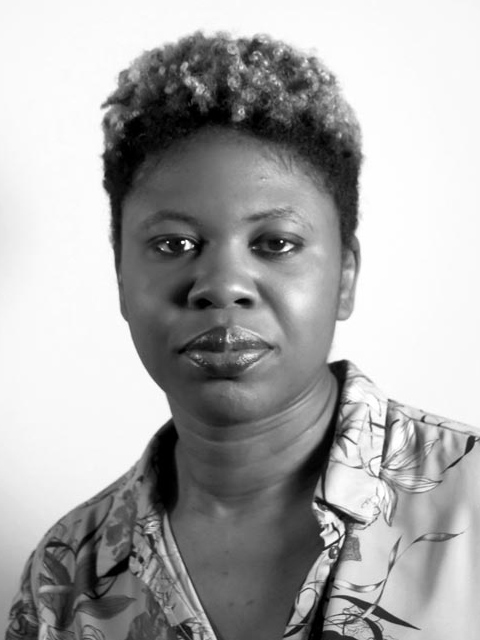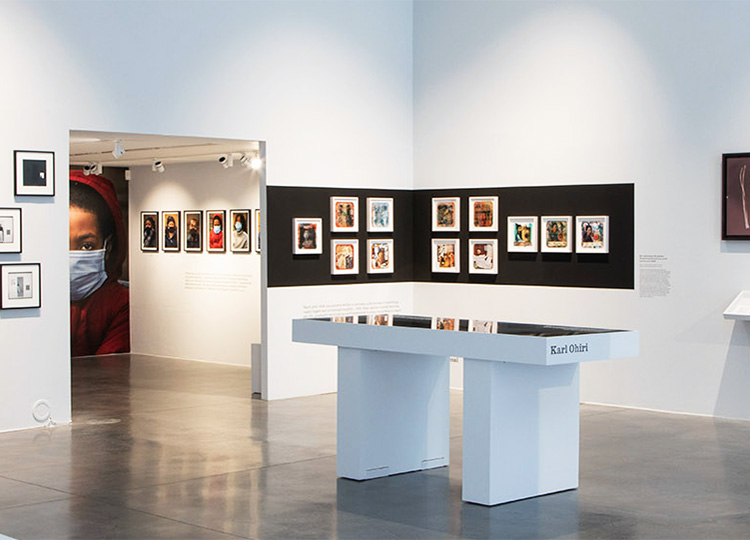Working across visual art practice, activism and academia, Ope Lori uses lens-based media to investigate politics of difference, often in relation to cultural and sexual identity. Her research-led practice, which includes writing as well as image-making, invites viewers to question power dynamics in both private and public spheres, routinely challenging societal stereotypes and myths.
In Lori’s new moving image works commissioned for Care | Contagion | Community – Self & Other, the artist explores her relationship with her father in The Lines Between Us (2020) and I, Becoming You (2020). Tracing their shared lineage of philosophy books, Lori creates a series of re-enactments in her family home in Essex, south-east England, to which she returned at the onset of the Covid-19 pandemic. In these interconnected multi-screen moving image works, themes such as family, culture, and diaspora are playfully addressed alongside politics of identity, gender, class, privilege and education: The Lines Between Us features the artist in a double performance – as herself, and as her father – reciting passages from Brazilian educational theorist Paulo Freire’s seminal book Pedagogy of the Oppressed (1968), while I, Becoming You juxtaposes archival footage of her father at home over a decade ago with a newly filmed re-staging in the same setting.
To contextualise this new art commission, we invited filmmaker Campbell X to speak with the artist about key themes in Lori’s commission and her wider artistic practice. This is published alongside a scholarly essay by Autograph’s senior curator Renée Mussai which situates Lori’s new film works in the context of Paulo Freire’s conception of changing human consciousness, dialogical action and performative re-enactment.

Ope Lori (born 1984, London) uses lens-based media to investigate politics of representation, often in relation to cultural and sexual identity. Her interdisciplinary research-led practice routinely challenges taboos and societal conventions.
Interested in positions of power and positionality, Lori’s multi-screen looped video installations such as I Want Me Some Brown Sugar (2013) and After All, Sometimes Just Changing The Point Of View Can Transform The Landscape (2016) confront different stereotypes deeply engrained in our social imagination. Lori holds a post-doctoral Research Fellowship at Transnational Art Identity and Nation Research Centre, University of the Arts London, where she completed her PhD in 2014. Her work has been exhibited nationally and internationally, including at La Fondation Blachére, France; Santorini Biennale of the Arts, Greece; 198 Contemporary Arts and Learning and Beaconsfield Gallery, both in London.
A former lecturer at Chelsea College of Arts and Leeds Arts University, she is the author of the forthcoming book, Beyond The Feminine: The Politics of Skin Colour and Gender in Visual Representations (Bloomsbury, 2021/22) and the director of PILAA (Pre-Image Learning And Action), an arts and diversity company which she founded in 2015.
You can see more of Lori's work on her website.
Initiated during the first months of lockdown in 2020, Autograph commissioned ten UK-based creative practitioners to create new work in response to the wider contexts of the Covid-19 crisis.
Find out more
Virtually visit the Care | Contagion | Community — Self & Other exhibition at Autograph
See moreCan you spare a few moments? Autograph is carrying out a survey to better understand who our digital audiences are. The survey should take no longer than five minutes to complete. Anything you tell us will be kept confidential, is anonymous and will only be used for research purposes.
The information you provide will be held by Autograph and The Audience Agency, who are running the survey on our behalf. In compliance with GDPR, your data will be stored securely and will only be used for the purposes it was given.
You can take the survey here. Thank you!

Images / films: from Ope Lori's commission, The Lines Between Us / I, Becoming You, 2020. Film, © and courtesy the artist, commissioned by Autograph for Care | Contagion | Community – Self & Other: 1) Film still [detail] from The Lines Between Us, 2020. 2, 6) Film stills from I, Becoming You, 2020. 3 - 5, ) Film stills from The Lines Between Us, 2020. 7) The Lines Between Us, 2020. Film, 16' 11". 8) I, Becoming You, 2020. Film, 5' 4".
Artist: 9) Courtesy Ope Lori
Part of the project: 10) Aida Silvestri, A Great Leveller [detail], 2020. From the commission Contagion: Colour on the Front Line. © and courtesy the artist.
Discover more: 11) Exhibition at Autograph. Photograph by Zoë Maxwell. 12) Cover of Autograph's new anthology Care | Contagion | Community — Self & Other. 13) Aida Silvestri, Tea [detail], from the commission Contagion: Colour on the Front Line, 2020. © and courtesy the artist. 14) Work from Poulomi Desai's commission Our cultures are the portals - the gateways between one world and the next [detail], 2020. © and courtesy the artist.
Autograph is a space to see things differently. Since 1988, we have championed photography that explores issues of race, identity, representation, human rights and social justice, sharing how photographs reflect lived experiences and shape our understanding of ourselves and others.